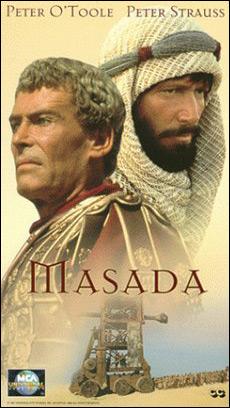Consider the Source: Masada Part II
Previously on the blog: Andrew writes about an obscure TV miniseries from the 1980s called Masada. He raves about Peter O'Toole's acting and Jerry Goldsmith's music. He criticizes David Warner's sissy villain Roman politician. And now... the exciting conclusion: The TV miniseries Masada takes its sweet time getting where it's going. But one of the things that stuck with me was its ending.
Recall that the Roman Tenth Legion, Commanded by Flavius Silva (Peter O'Toole), is laying siege to the mountain fortress of Masada, where the last Jews fighting the Roman occupation of Judea are holed up.
But when the Romans finally break into the fortress, they find the Jews inside have all killed themselves, rather than fight or be taken prisoner.
The sequences where Eleazar and his friends decide to do this are... I don't know how else you'd do it, but it still feels really yucky.
Perhaps I hadn't mentioned– these aren't just Jewish soldiers up in Masada. They have women and children, Rabbis even, as well. Eleazar has his wife and son with him. He and his fellow Zealots[ref]I'm getting to that.[/ref] come to agreement relatively quickly, but the others "Need to be told another way."
If there is one major flaw with Masada, it is portraying the beliefs of the hold outs in the fortress as the same as mainstream Jews elsewhere in Judea. They were not. Eleazar and  his followers were radicals. There's a reason why they were the only ones still fighting the Romans at this point.
his followers were radicals. There's a reason why they were the only ones still fighting the Romans at this point.
I'm sure there were lots of reasons why the story was portrayed this way: The series is bookended by a swearing-in ceremony for the Israeli Army, held at the fortress. A narrator explains that the soldiers are defending their homeland, just like Eleazar and his Sicarii were. Shooting was done at the actual site of the fortress, which would have required the permission of the Israeli government.
It's worth pointing out that Jewish law generally prohibits both suicide and murder- something that is never brought up in the film.
The main source we have for what happened at Masada is an account written by Josephus, a Jewish historian who defected to the Romans. Not eager to disparage either side, he should not be taken at face value. Some modern historians[ref]Noble Deaths at Gamla and Masada?A Critical Assessment of Josephus' Accounts of Jewish Resistance In Light of Archaeological Discoveries by Kenneth Atkinson pp 357.[/ref] have suggested the mass suicide was either exaggerated or never happened at all.
Josephus calls Eleazar and his hold outs "Sicarii," named after the easily concealable daggers they carried with them. They were a radical faction of Zealots, who were opposed to Roman rule. Not content with assassinating their oppressors, they also killed collaborators and other Jews who didn't agree with them. They've also been blamed for a raid on the village of Ein Gedi, where 700 people, including women and children were killed.
These were the people who were at the top of the cliff. Not anyone looking for a compromise with the Romans.
I get that these were extreme circumstances. But I felt like I was watching the people of Jonestown, not a group of plucky rebels making a principled stand.
Anytime you adapt historical events, compromises have to be made, and you'll be criticized for any inadvertent or purposeful inaccuracies. Masada goes to great lengths to make sympathetic characters out of the siege-laying Romans, especially Silva, and the Zealots in the fortress.
The Romans did terrible things– from using slave labor during the siege to occupying Judea in the first place. But the Zealots were not paragons of virtues either.
We should not try to sort people of history into heroes and villains. But both sides in this movie have an honorable sheen that I don't think is well deserved.
